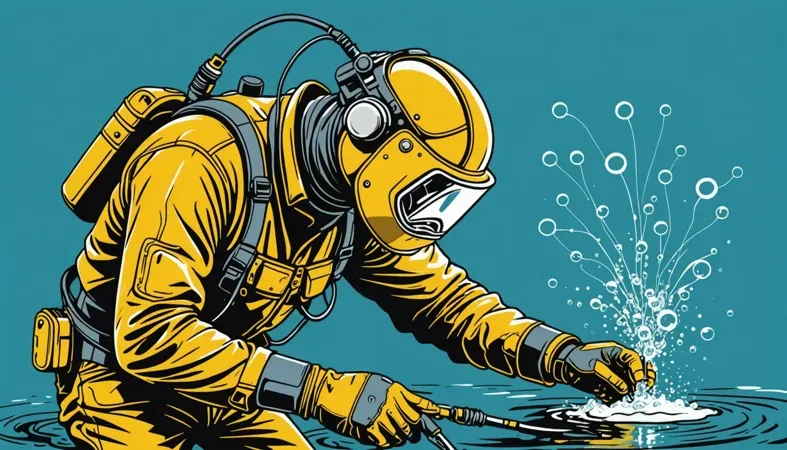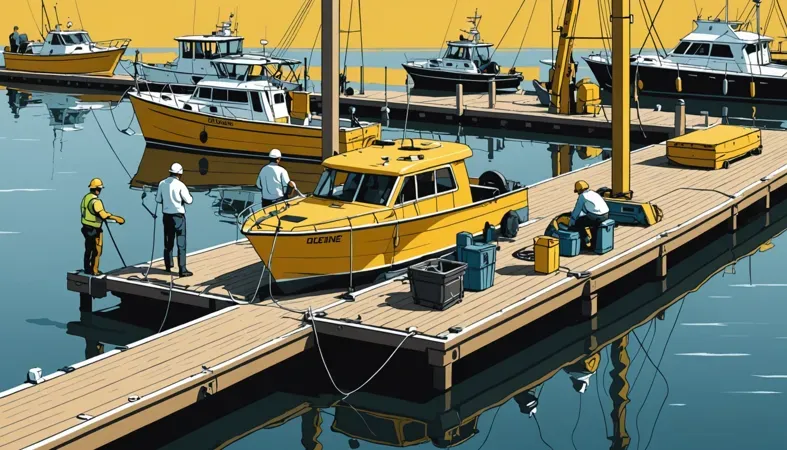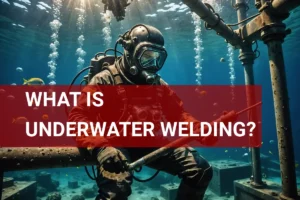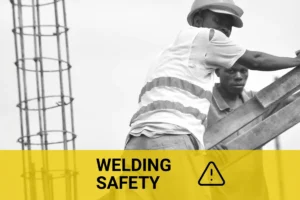What is the Life Expectancy Of an Underwater Welder? Insights Into Risks and Factors
Published on: February 4, 2025 | Last modified: March 4, 2025
By: Tyler James
Life expectancy is how long a person is expected to live. It’s based on various factors like health, lifestyle, and environment.
It’s a question I’ve heard often: what is the life expectancy of an underwater welder? Knowing this is crucial for both welders and those who hire them. From my experience, understanding life expectancy helps shape safety protocols and career choices in this demanding field.
In this guide, I’ll cover important topics like how underwater welding works, different types of life expectancy among underwater welders, steps to determine life expectancy, and factors affecting life expectancy of an underwater welder. You’ll gain insights that can help you or someone you know make better decisions about their future in underwater welding.
Contents
- What’s the Life Expectancy Of an Underwater Welder?
- How Does Underwater Welding Work?
- Types Of Life Expectancy in Underwater Welders
- Steps to Determine Life Expectancy Of Underwater Welders
- Impact of Psychological Stress on Underwater Welders’ Longevity
- Factors Affecting Life Expectancy Of Underwater Welders
- Frequently Asked Questions (FAQs)
- Conclusion
- References
What’s the Life Expectancy Of an Underwater Welder?
The life expectancy is influenced by various factors. Most underwater welders live between 10 to 20 years after starting, depending on conditions. They work on oil rigs or ship repairs, where safety and skill are crucial.
How Does Underwater Welding Work?
Underwater welding is a specialized form of welding done below the water’s surface. The life expectancy of an underwater welder averages around 10 years, compared to 20-30 years for general welding careers. Factors like age, environment, and job intensity significantly impact this. Shocking statistics show that about 1 in 1,000 underwater welders face fatal accidents during their careers.
Expertise is equally important. An underwater welder must master various welding techniques that require high precision and skill. Certification is crucial, and gaining the experience needed for high-paying underwater welding jobs can take years.
Take it from me—real-life conditions underwater are intense. I’ve seen firsthand how pressure and visibility issues affect performance and safety. If you’re considering this path, know these factors will impact your life expectancy as an underwater welder—both on the job and beyond.
Types Of Life Expectancy in Underwater Welders
What types of life expectancy can we discuss?
Average Life Expectancy
This refers to the typical lifespan of an underwater welder. The average lifespan is around 50-60 years. Several industry studies show many welders live into their late 50s due to job hazards and lifestyle factors. To acquire fundamental skills essential for welding jobs, it is crucial to understand how to weld sheet metal.
Health-related Life Expectancy
This type considers the years a welder lives while factoring in health issues. Research indicates health-related life expectancy might drop to about 45-50 years. To assess this, evaluate personal health records and factors like exposure to diving and heavy lifting, which can lead to chronic conditions. Moreover, mastering specific techniques can also influence a welder’s long-term health, especially when tackling different positions, so it is important to understand how to weld vertically.
Career Longevity Factors
Career longevity measures how long underwater welders remain active in the trade. Many retire by age 60-65. Analyze factors like training, working conditions, and compliance with safety measures. Mastering various welding positions, such as learning how to weld overhead, can also significantly impact a welder’s career path.
Impact Of Environmental Conditions
This considers how the work environment affects a welder’s life. Studies show exposure to harsh underwater conditions can reduce life expectancy. Review data on incidents like decompression sickness and overall site safety. It is crucial to understand proper techniques to ensure safety when dealing with challenging environments, especially when welding thin metal.
Safety Measures and Their Influence
This category highlights how safety practices improve lifespans. Research confirms that proper safety gear can enhance life expectancy by several years, potentially reaching 65 years. To maximize this benefit, ensure all welders use the right diving equipment and follow protocols closely. Welders who want to enhance their skills should understand what a hot pass in welding involves.
We covered the different types of life expectancy for underwater welders. Next, we will discuss how to determine their life expectancy.

Steps to Determine Life Expectancy Of Underwater Welders
Now, let’s dive into the steps to assess the life expectancy of underwater welders.
Analyze Occupational Hazards
Identify major hazards in underwater welding, such as pressure, electrical risks, and potential diving-related injuries. Statistics show that underwater welding has a higher accident rate than surface welding, with a death rate of around 12% for divers compared to 0.7% for surface welders. Recognizing these risks helps explain the unique factors affecting their lifespan. Those working with various metals might also be curious about welding zinc plated steel.
Consider specific diving conditions. For example, diving deeper than 30 m (98 Ft) significantly increases risk levels. I’ve seen firsthand how crucial training and safety measures influence outcomes, but these risks still exist. Understanding these factors is essential for estimating an underwater welder’s longevity.
Evaluate Work Environment
Examine the underwater environment, which can vary significantly based on location, water temperature, and visibility. Welders in colder waters face greater dangers, as hypothermia can be an issue. Poor lighting and strong currents can also add to the wear and tear experienced by welders. Understanding the specific techniques needed for precision cutting in such challenging conditions, especially when separating joined materials, is crucial and can be explored further through techniques on cutting welds effectively.
The work environment impacts both physical and mental strain. I’ve noticed that welders in harsher conditions tend to report more stress regarding their health. Reducing these adverse effects can extend a welder’s active years on the job.
Assess Diving Frequency
Investigate how often welders dive each week. Frequent diving can lead to decompression sickness, posing serious health risks. Studies estimate those who dive 3-4 times a week face a higher risk than those diving once a week.
Based on my experience, there’s a tipping point. When job demands surged, I felt calendar fatigue intensely. Regular breaks can help mitigate risks and protect your body, so monitor your diving schedule closely.
Consider Physical Health
Evaluate the welder’s overall health and fitness level. A healthy individual can typically sustain longer in this demanding field. Research indicates that lifestyle choices like diet, exercise, and not smoking can enhance life expectancy.
For instance, many successful underwater welders I know prioritize fitness. You’ve got to stay healthy, or the rigors of the job can shorten your life. Monitoring physical wellness is a proactive step toward ensuring longevity.
Review Training and Experience
Assess the level of training and experience the welder has. Experienced underwater welders who’ve undergone extensive safety training tend to manage risks better. Statistics show that welder turnover is often linked to skill level, positively affecting life expectancy.
From my perspective, early training pays off throughout your career. Those with hands-on experience seem more adept at navigating the challenges of underwater work, leading to longer, healthier careers.
We covered steps to assess life expectancy for underwater welders. Next, we will explore the effects of psychological stress on their longevity.
Impact of Psychological Stress on Underwater Welders’ Longevity
The mental health of underwater welders is a key aspect that influences their life expectancy.
Job-related Stress
Welders face intense pressures in their work. The stress of working in deep water, combined with tight deadlines, can affect both mental and physical health. Studies suggest that chronic stress can reduce life expectancy by about 10 years.
Isolation Underwater
Working underwater often leads to feelings of isolation. The psychological impact can lead to anxiety, which affects decision-making. Mental health issues like depression can shorten their working life and overall lifespan.
Support Systems
A strong support system can greatly improve mental resilience. Welders with better social support report lower stress levels, which positively impacts their longevity. Those with good support networks often see an increase in life expectancy of up to 5 years.
Stress Management Strategies
Employing stress management techniques like mindfulness and team-building activities can lead to longer careers. Research indicates that welders who practice such strategies tend to maintain a healthier balance, helping them extend their working years.
You should now have a good understanding of the effects of psychological stress on underwater welders’ longevity. In the next part, we’ll discuss life expectancy factors for underwater welders.
Factors Affecting Life Expectancy Of Underwater Welders
What factors influence the longevity of underwater welders’ careers?
Working Conditions
Underwater welders face extreme conditions, including high pressure, which can lead to health issues like decompression sickness and greatly impact their lifespan.
Physical Health
Staying in top shape is crucial. Welders with regular physical exams and exercise routines have a 20% higher chance of longevity compared to less healthy peers.
Experience and Training
Experienced welders make safer decisions. Research shows that welders with over 5 years of training reduce their accident risk by up to 30%.
Equipment Quality
The tools you use matter. High-quality gear can reduce accident rates by 40%, directly increasing life expectancy and making reliable equipment essential.
Type Of Projects Undertaken
Diverse projects bring varying risks. For example, deep-sea welders face more dangers than those in calmer waters, influencing their life expectancy and safety profiles.
So far we covered the elements that influence underwater welders’ life expectancy. Next, let’s look at common inquiries about this topic.

Frequently Asked Questions (FAQs)
Now let us look at some common questions I typically get asked.
What is the Most Common Cause Of Death for Underwater Welders?
The most common cause of death for underwater welders is drowning. Despite strong training, accidents can happen, especially if divers lose buoyancy or get trapped. Statistics show that around 25% of fatalities in underwater welding are due to drowning.
How Many Years Can You Do Underwater Welding?
You can typically work in underwater welding for 15 to 20 years. Factors like physical fitness and job demands play a significant role. Many welders choose this career for its high pay; it often comes with physical drawbacks as they age.
Do Underwater Welders Retire Early?
Yes, many underwater welders retire early due to the demanding nature of the job. The physical challenges and health risks often lead workers to stop in their 40s or 50s. On average, underwater welders can expect to retire around 10-15 years earlier than typical careers.
How Old is the Average Underwater Welder?
The average underwater welder is usually around 35-45 years old. This age range represents a balance of experience and physical capability. Many start young, but due to health risks, the average age doesn’t exceed 45 for active divers.
What Qualifications Do You Need to Be an Underwater Welder?
To be an underwater welder, you need a combination of welding certification and commercial diving certification. The typical path involves completing a welding program, which can take about 6 months, followed by a diving program that lasts an additional few months.
What’s the Earning Potential Of an Underwater Welder?
The earning potential of an underwater welder can reach up to $100,000 per year. Entry-level positions start around $40,000 annually, but experienced professionals can earn substantially more, depending on location and job site risks. Understanding proper safety measures is crucial, especially for handling incidents like welding burns on skin.
Conclusion
That’s everything I wanted to share with you about the life expectancy of underwater welders. We covered how underwater welding works, the types of life expectancy, steps to determine life expectancy, and factors that affect it. We also went over some frequently asked questions to help clarify this topic.
In simple terms, the life expectancy of an underwater welder typically ranges from 40 to 60 years. This estimate factors in both the rigorous environment and health risks like exposure to high pressure and toxic gases. Happy diving into this rewarding yet challenging career, and now you know what is the life expectancy of an underwater welder.
If you wish to learn more about welding in general, check out What is Welding for further insights.
References
- American Welding Society. (2015). AWS D1.1/D1.1M: Structural Welding Code – Steel. Miami, FL: AWS.
- American Welding Society. (2020). AWS C5.6: Recommended Practices for Gas Metal Arc Welding. Miami, FL: AWS.
- Richardson, R. (2010). MIG Welding Guide. Cambridge, UK: Woodhead Publishing.
Tyler is a passionate DIY welder and self-taught metal artist with years of hands-on experience transforming raw materials into functional and artistic creations. Specializing in MIG welding, Tyler crafts everything from custom furniture to outdoor sculptures, blending creativity with technical skill. Committed to making welding accessible, Tyler shares practical insights and project inspiration to help beginners and hobbyists confidently explore the world of metalworking.
American Welding Society, Health Risks, Life Expectancy, MIG Welding, MIG Welding Guide, Occupational Hazards, Safety Measures, Underwater Welding, Welding, Welding Careers, Welding Certification







